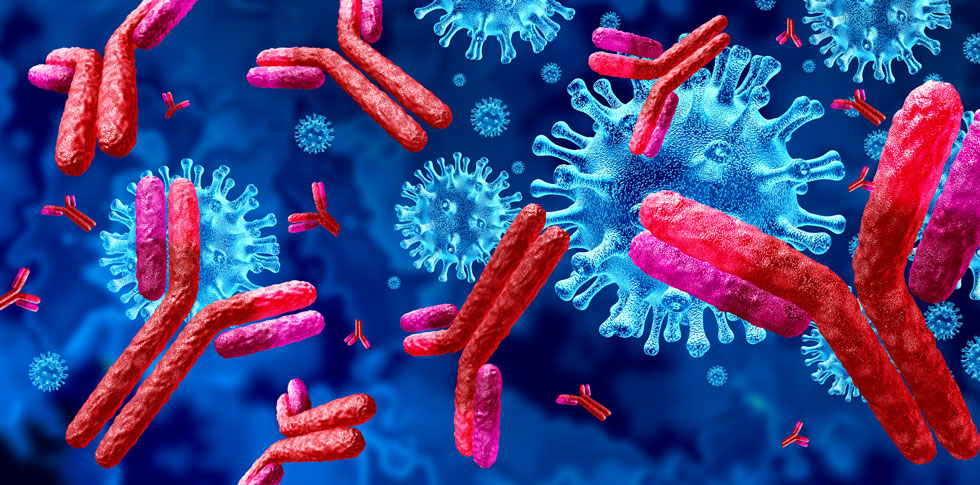By B. Jeanne Billioux, MD and Avindra Nath, MD
For this Neuro-COVID-19 update, we review several recent articles on SARS-CoV-2 viral persistence, including Post-Acute Sequelae of COVID-19 (PASC), or Long-COVID, including viral antigen persistence as a potential mechanism, and long-term PASC symptoms over three years of followup.
The mechanisms for PASC have so far remained elusive; however, recent studies focusing on SARS-CoV-2 antigenic persistence have revealed this phenomenon as a potential driver for PASC.
A recent piece in Lancet Infectious Disease by Peluso et al. detailed findings of persistent antigen in COVID-19 patients over a 14 month period following infection. The investigators measured SARS-CoV-2 spike, S1, and nucleocapsid antigens with Simoa single molecule array detection in a well-characterised group of patients (n=171) who had had COVID-19 a single time, before vaccination or reinfection, compared to a group of control serums (n=250) prior to 2020.
The antigens in the patient group were checked at several timepoints post-infection; 42 of the patients were found to be positive for at least one of the antigens at some timepoint post-COVID, with spike protein being the most commonly detected antigen (n=33). The assay used had a 98% specificity, with 2% of the pre-pandemic samples being positive. Unsurprisingly, antigen positivity decreased over time, but there was still a 5.4% prevalence of antigen positivity in COVID-19 patients 14 months after infection. Patients who were hospitalised and patients (who were not hospitalised) who reported worse health were more likely to have antigen positivity than post-COVID patients who were not hospitalised and reported good health.
While this study did not look at PASC specifically, the findings suggest that SARS-CoV-2 infection may lead to antigenic persistence in some patients, particularly those who were more ill, and may play a role in persistence of symptoms even in patients who were not ill enough to be hospitalised (Peluso 2024).
Another study using the same antigen testing looked at patients who had COVID-19 and developed PASC (n=37) vs those who had COVID-19 and did not develop PASC (n=26), similarly found antigen positivity by either Spike, S1, or N, within several months after infection in 65% of the PASC patient cohort. In the post-COVID (without PASC) patients, antigen was detected only in the week of infection, but not after. The Spike protein was again the most common antigen detected in PASC patients (60%). Additionally, the investigators found that the more symptoms a patient had affecting multiple body systems, the more likely the patient was to be antigen positive (Swank 2023).
Other studies have also found a relationship between viral persistence and PASC as evidenced by detection of SARS-CoV2 RNA. One study evaluated the intestinal mucosa of patients undergoing biopsy for inflammatory bowel disease who had also had mild forms of COVID-19; 70% of these patients were found to have SARS-CoV-2 RNA in their intestinal mucosa about 7 months after infection, and this viral persistence was associated with PASC symptoms (Zollner 2022). Additionally, a case series of three patients with persistent anosmia found SARS-CoV-2 RNA in olfactory mucosal tissue 110-196 days after onset of symptoms despite negative RT-PCR results on nasopharyngeal swab (de Melo 2021). However, it is important to note that these patients do not seem to be transmitting the virus. Further, to date there is no evidence for transmission of SARS-CoV-2 by blood transfusion or by organ transplantation. This suggests that likely viral antigen or defective viral sequences persist rather than complete viral particles. This is further supported by a recent randomized clinical trial evaluating the efficacy of a 15 day course of the protease inhibitor nirmatrelvir-ritonavir vs placebo in patients with PASC revealed no benefit in improving PASC-related symptoms, however (Geng 2024). These patients were, on average, more than 16 months out from their infection before enrolling in the trial, which brings to question whether or not an earlier course of treatment could have more of an effect. Additionally, targeting patients who specifically have signs of viral persistence could be another consideration in future clinical trials of PASC.
The concept of SARS-CoV-2 persistence and its association with PASC is quite intriguing, and an area of much-needed research, regarding both the nature of these potential viral reservoirs as well as in relationship to the treatment of PASC. Clinical trials are needed to stimulate the immune system or reverse immune exhaustion to see if this may help remove the viral remnants and alter the course of the illness.
References
-
Peluso MJ, Swank ZN, Goldberg SA, Lu S, Dalhuisen T, Borberg E, Senussi Y, Luna MA, Song CC, Clark A, Zamora A. Plasma-based antigen persistence in the post-acute phase of COVID-19. ⧉ The Lancet Infectious Diseases. 2024 Jun 1;24(6):e345-7.
-
Swank Z, Senussi Y, Manickas-Hill Z, Yu XG, Li JZ, Alter G, Walt DR. Persistent circulating severe acute respiratory syndrome coronavirus 2 spike is associated with post-acute coronavirus disease 2019 sequelae. ⧉ Clinical Infectious Diseases. 2023 Feb 1;76(3):e487-90.
-
Zollner A, Koch R, Jukic A, Pfister A, Meyer M, Rössler A, Kimpel J, Adolph TE, Tilg H. Postacute COVID-19 is characterized by gut viral antigen persistence in inflammatory bowel diseases. ⧉ Gastroenterology. 2022 Aug 1;163(2):495-506.
-
de Melo GD, Lazarini F, Levallois S, Hautefort C, Michel V, Larrous F, Verillaud B, Aparicio C, Wagner S, Gheusi G, Kergoat L. COVID-19-related anosmia is associated with viral persistence and inflammation in human olfactory epithelium and brain infection in hamsters. ⧉ Sci Transl Med. 2021. DOI: https://doi. org/10.1126/scitranslmed. abf8396.
-
Geng LN, Bonilla H, Hedlin H, Jacobson KB, Tian L, Jagannathan P, Yang PC, Subramanian AK, Liang JW, Shen S, Deng Y. Nirmatrelvir-Ritonavir and Symptoms in Adults With Postacute Sequelae of SARS-CoV-2 Infection: The STOP-PASC Randomized Clinical Trial. ⧉ JAMA Internal Medicine. 2024 Jun 7. DOI: 10.1001/jamainternmed.2024.2007








